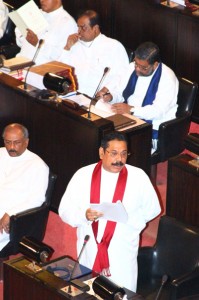Budget of handouts, national debt will worsen
View(s):
President presenting the Budget
By Kajanga Kulatunga
I can’t help but feel that budget 2013 felt more like budget 1990 or 1996 for that matter. All the somewhat bold decisions of the administration over the last three budgets seem to have taken a back seat this time. We are back to giving hand-outs in the name of poverty alleviation. Not only is this questionable policy, but it makes the national debt burden much worse in five years-time. I was hoping for a budget to build on the rather productive infrastructure projects. Outside of the major canal project for Colombo district, this budget has been poor on infrastructure investment. Congestion taxes or a mass transit system for the city of Colombo aren’t even on the agenda.
As I have always argued, the best way to distribute growth and alleviate poverty is to foster entrepreneurship. Creative destruction should be embedded in our national psyche from cradle to grave. The only form of government assistance should be to help set up businesses, ideally those that have an inventive or innovation bent to it, and help promote those overseas. Provide significant tax breaks for new industries and you will get a rapid culture of innovation as the fundamental need for most human beings is to create their own future. Instead, we have a rather mixed bag of carrots and sticks. The odd carrot is of course the bizarre notion of racing cars being tax except. Under what great economic model racing cars help achieve any budgetary goal alludes me. On the impractical side comes the notion of giving land to be cultivated. The reason why this is largely misplaced is because it seems we as a country are not willing to face up to the demographic challenge that is about to hit is in five years. That for the first time in recorded history we will have more people over the age of 50 than those under 18. We are in need of bold budget policies to address this reality. Hoping that cultivation will alleviate poverty and unemployment in this demographic scenario is questionable.
Revenues are stretched as the government continues to expand the size of the public service. This is unsustainable. While the pay rise may be justified given runaway inflation, the rises are a self-fulfilling prophecy where they need to be funded through further consumption taxes. Taxes on foreigners is always a marvelous idea. Which is why I also believe in consumption taxes for economies which have a large influx of tourists. The tax on airport passengers/services however, hurts poor female domestic aides to the Middle East who make up a bulk of passengers out of BIA. Increasing taxes on all motor vehicles, as opposed to a significant rise for luxury vehicles is unlikely to go down well with most voters. After all, what fairness is there in paying similar fees to register a 4WD vehicle as it does a small 4 door family car?
The government has also missed a great chance to bring the stock market into line and remove some of the nasty forces at work. They should have taken a bold step and introduced a holding period tax, where gains for any shares held for less than 12 months be taxed at a punitive 40 per cent. With one small distinctive tax of that nature, the market would settle down a lot faster. The decision to tax unit trusts is quite unproductive and at odds with the “no tax” policy of shares.
The controversial education sector seems to have got some relief. While details and actual disbursement will still need to happen, the mere mention of a focus on research and development is a welcome move. The next step now is to develop strong commercialization arms at the local universities so that the taxpayers can benefit from the research they fund. At the moment we allow those who are educated by the taxpayers to pillage most patent and intellectual property rights away from the country and attach it overseas.
On balance, this budget looks more retro than the path-breaking types that have been presented by this President over the last five years (think personal income tax reform or infrastructure spending). Whether this is an anomaly, or the new reality remains to be seen. Everyone is hoping it is the former. If it is the latter, it unfortunately means that, at least from a macro economic perspective nothing much has changed since 1990 or 1996.
(Kajanga is a Portfolio Specialist currently working in Sydney, Australia. You can write to him at kajangak@gmail.com).
Follow @timesonlinelk
comments powered by Disqus





















